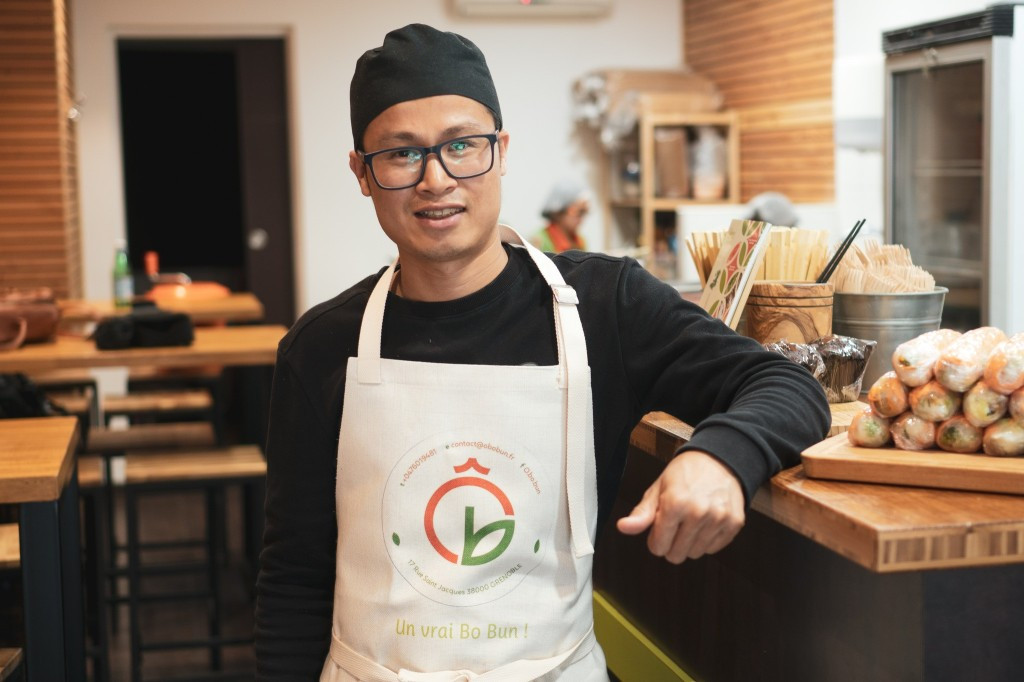
In 2011, Phong began work at Renault as a project manager and received high pay.
After one month of working there, he received bad news that his family in Vietnam had gone bankrupt with a huge debt of $1 million. Phong, who then had a stable job with high pay, was expected to help the family pay its debts.
When Phong was in a deadlock, in 2014, a friend of Phong’s invited him to visit a relative in Grenoble city. Phong could not imagine that meeting the Vietnamese-born woman in France would change his life.
“Tra had been living in France for 30 years and running a restaurant. The business was relatively good at that moment. As Tra was old and wanted to give up business, she wanted to sell the restaurant to Phong for 150,000 euros,” Phong recalled.
Though Phong did not have money and banks did not agree to lend money because he had no collateral for loans, Tra agreed to sell it to Phong with payment by installment.
He borrowed 20,000 euros from his friends and gave the amount to Tra and promised monthly payments at bank interest rates.
In July 2015, Phong officially left Renault and began running an old and small restaurant in Grenoble which specializes in selling Vietnamese fried spring rolls.
Phong, who worked in air-conditioned office and only used pen and computer, then had to learn how to hold a knife to peel carrots, cut up meat, fry spring rolls, and clean the toilet.
“I don't remember how many times my hands bled, but I always felt I was filled with energy of hope as I had the chance to learn new things,” he recalled.
Phong’s wife gave birth to a child just two months after he began doing business. He had to arrange his time to both take care of his wife and baby and run the restaurant.
There were many difficulties, but he felt happy as he could ‘unleash’ himself and do what he wanted with the firm belief that he would succeed in making the Vietnamese cuisine well known worldwide.
“I really became a new person and began undertaking a new role that fate gave to me. There were so many difficulties and challenges, but I never thought of giving up. Despite the thorny path, I always believed in my better future,” he said.
Phong had to get up at 6 am every day, go to the market to buy materials to process dishes, receive customers, and clean up and close the door at 10 pm. He had lunch, mostly a bowl of fried rice, after customers finished their lunch.
Though the initial revenue was still low, he still observed regulations by making declarations and paying tax, while always ensuring financial transparency.
As the business improved with revenue up by 30 percent, he got a bank loan and paid money to Tra.
The mission
One problem arose in his business: the restaurant had few customers in summer because it was small and hot.
In summer 2017, when Phong visited Ôbobun restaurant which served a Vietnamese dish, rice vermicelli mixed with spring rolls, shrimp, vegetable and spices, he was informed by the owner that he wanted to sell the restaurant.
Phong decided to get another bank loan to buy the restaurant. The transparency of financial reports and the success of the first restaurant helped him get the loan with no collateral required.
He had to spend many days to think of a solution, analyze costs, seek suitable suppliers, negotiate prices, and optimize the production process to minimize costs.
Phong continued to work, while dreaming that Ôbobun would become an international place and stand on its own in the market rankings, not just part of Thai/Vietnamese/Chinese restaurant dishes.
Tuan Nguyen